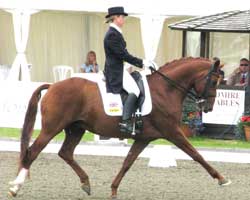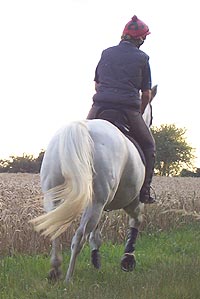
Magnesium - A calming supplement for excitable Horses
 Many
horse owners use equine calming supplements containing
magnesium to calm their nervous, excitable, stressed,
or spooky horses - especially before competitions or during periods of
box rest.
Many
horse owners use equine calming supplements containing
magnesium to calm their nervous, excitable, stressed,
or spooky horses - especially before competitions or during periods of
box rest.
Some of the most popular of these equine feed supplements contain magnesium which is known to calm the nervous and cardio-vascular system and relax the muscles and help to manage frightened or unpredictable behaviour or nervous habits such as headshaking.
USING MAGNESIUM TO CALM A HORSE BEFORE A COMPETITION
Magnesium has been proven to be an effective and legal way to relax and calm a horse before a competition, show or race and is used by National Hunt, flat racing, dressage and show jumping yards.
 Horse
owners who just want a quiet, happier ride out are also benefitting from
feeding magnesium as a supplement.
Horse
owners who just want a quiet, happier ride out are also benefitting from
feeding magnesium as a supplement.
Magnesium has an important part to play part in muscle and nerve and function.
Magnesium can calm the nervous and cardio-vascular systems and induces muscle relaxation.
SIGNS OF MAGNESIUM DEFICIENCY
Horses and ponies that have a deficiency in magnesium may show signs of nervousness, excitability and muscle shaking.
Some horses become especially "fresh" in the springtime. The fast growth rate of grass in spring means that spring grazing has an increased sugar content and is also often deficient in magnesium. As a result many horses become much more excitable, some become almost unrideable - feeding a horse feed supplement containing magnesium can help to control this, but this should never be used in place of good grazing management.
Stress in the horse, caused by training, travelling and equestrian competition, can also cause a magnesium deficit and an excess of calcium - this can result in excitability, tension and muscle cramps.
DIFFERENT TYPES OF MAGNESIUM SUPPLEMENTS FOR HORSES
The easiest form of magnesium as a supplement for horses to absorb is magnesium oxide, however other forms are available - including Magnesium Glutamate, Magnesium Aspartate, Calcium Magnesium (dolomite) often referred to as CalMag and magnesium sulphate more commonly known as Epsom salts.
Equine magnesium supplements come in several forms including powders and pastes in syringes for quick and easing dosing.
When feeding a supplement always carefully follow the manufacturers instructions to get the correct dose for your horse.
|
|
HORSE CARE ADVICE AND EQUESTRIAN ARTICLES
Treating Ringbone | Riding a Napping Horse | Haylage | Angleberry Warts - horse wart virus | Box Rest Herbs | Selenium for Horses | Feeding Garlic to horses | Devil's Claw | Hydrotherapy | Bran mash | Mare in Foal | Livery Yards in West Sussex | Horse feed supplies - Norfolk | Horse bedding advice |Choke | Iridology | Bone Spavins | Equine Dentistry | Hoof care tips | Aubiose | Bran mash | Mud fever | Horse Colic | Liver | Calming Herbs | Buying a Trailer | Bot Fly Eggs | Horse Nosebleeds | Sticky Stifle | Headshaking Horse | Wiltshire Livery Yards | Diagnosing Shoulder Lameness | Tack Saddlery Berkshire |